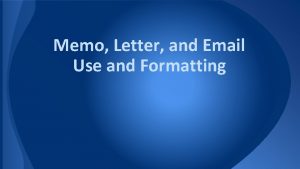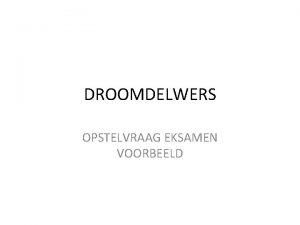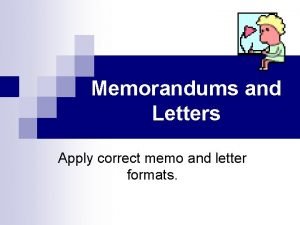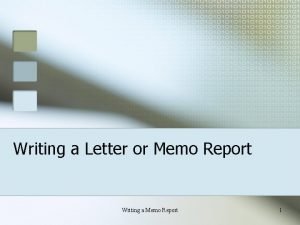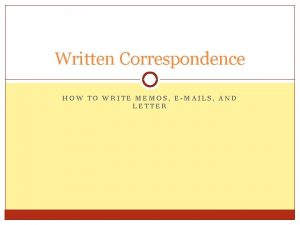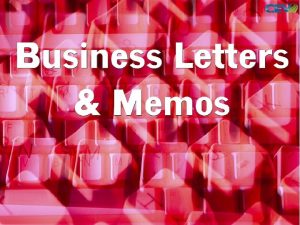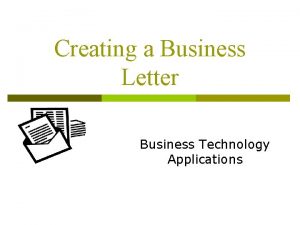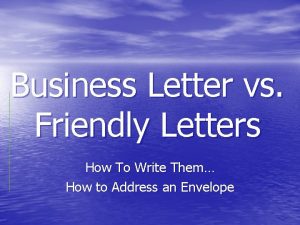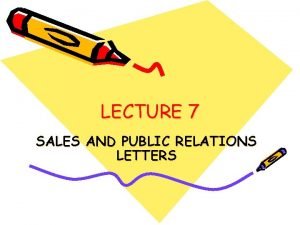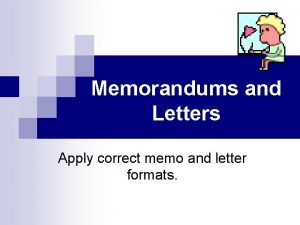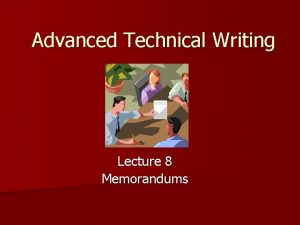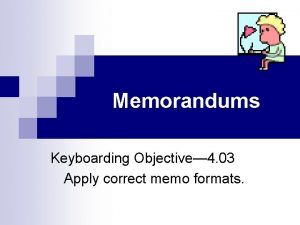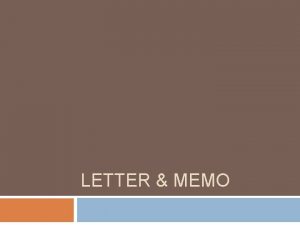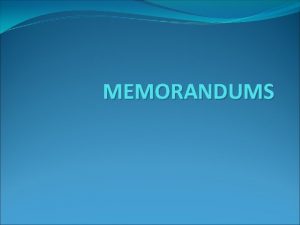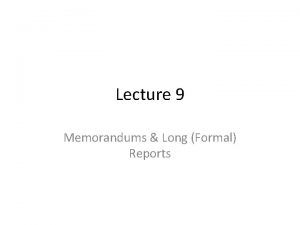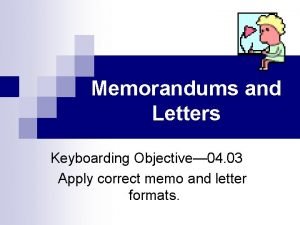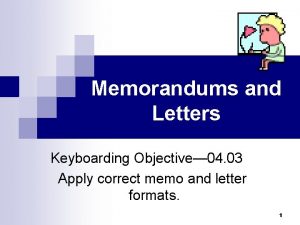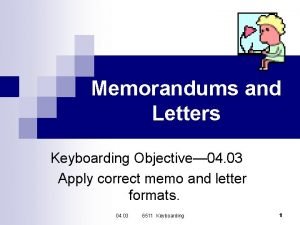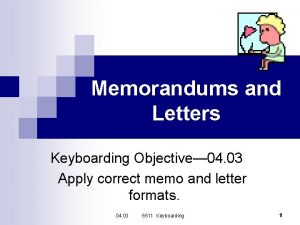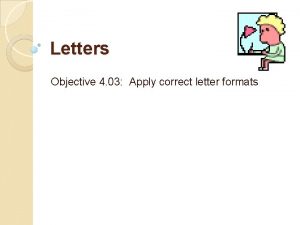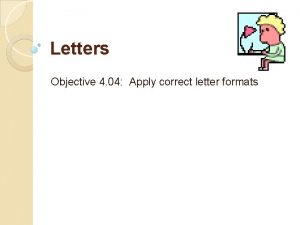Memorandums and Letters Apply correct memo and letter

















- Slides: 17

Memorandums and Letters Apply correct memo and letter formats.

What are Memorandums? n A memorandum is a short message from one person to another in the same business or organization. n Memorandums are usually referred to as memos. n Memos have no salutation line and no signature area at the end.

Memo Formatting Rules Margins: n n n TM-2 inches RM-1 inch BM-1 inch LM-1 inch Use a standard font style and font size i. e. Times New Roman/Arial and 12 point font. Single Space within paragraphs and double space between paragraphs. All parts of the memo begin at the left margin, including paragraphs. (Block Style Format)

Memo Heading The formal memorandum uses a special heading, sometimes preprinted on stationery. Typically, words in the memo heading are keyed in ALL CAPS, bold, followed by a colon, and double spaced as follows: TO: (Reader’s name) FROM: (Author’s name) DATE: (Complete and current date) SUBJECT: (What the memo is about)

Keying Formal Memos 2” TO: Tab Receiver’s name (DS) FROM: Tab Author’s name (DS) DATE: Tab Current date 1” (DS) 1” SUBJECT: Tab Memo topic (DS) Body-Message of the memo (DS) Typist initials 1” n The memo heading should by keyed in all capital letters, bold, and followed by a colon. n Use the tab key to align information following the memo heading. n When keying the body, single space within paragraphs and double between paragraphs.

Parts of a Memo heading Memo body Typist initials

Notes to Remember! ü ü If someone other than the writer of the memo keys the memo, typist initials should be included. Typist initials are keyed in lower case with no space and no punctuation. If you have an attachment or enclosure notation, double space after typing typist initials and type “Enclosure” or “Attachment. § Enclosure-Something is included with the memo. § Attachment-Supporting document is attached by a paper clip, staple, etc. If someone in addition to who the memo is originally written will be receiving a copy of the memo, include a copy “c” notation.

Types of Letters Personal—Business Letter n A personal-business letter is a letter that is sent from an individual using their home address to a person or business/organization. Business Letter n A business letter is sent from a business or organization to an individual or to another business or organization. n Business letters are usually keyed on letterhead. The letterhead can consist of the business’ name, address, phone/fax/email, and logo.

Major Parts of a Letter 1. 2. 3. 4. 5. 6. 7. 8. 9. Return Address-the address of the person writing the letter. Letterhead if the letter is from a business. Dateline-Complete and current date. Letter Address/Inside Address-the address of the person receiving the letter. Salutation-the greeting of the letter. Example: Dear Sir or Madam: Body-the message of the letter. Complimentary Close-the ending of the letter. Example: Sincerely yours, Keyed Name-the authors typed name. Handwritten Signature-the author signs the letter after it has been printed. Typist Initials-initials of the typist. .

Formatting a Letter Margins: TM-2 inches RM-1 inch BM-1 inch LM-1 inch Block Style is one method of formatting a letter. In this style of letter writing all parts of the letter are keyed at the left margin. n n n Paragraphs should not be indented in this style of letter. Use a standard font style and font size i. e. Times New Roman/Arial and 12 point font. Single Space within paragraphs and double space between paragraphs.

Parts of a Block Style Letter Return address Letter address Date Salutation Body Complimentary Close Enclosure notation Writer Copy Notation —key a DS after the last line of the letter.

Punctuation Styles Open Punctuation n There is not a colon or comma in the salutation and there is not a comma in the complimentary closing. Mixed Punctuation n A colon is in the salutation and a comma is in the close. Example: Dear Ms. Smith Sincerely yours Example: Dear Ms. Smith: Sincerely yours,

Personal—Business Letter with Mixed Punctuation Return Address: The personal-business letter uses the return address with the dateline a single space beneath. Mixed Punctuation: The colon is keyed in the salutation and the comma is keyed in the complimentary close.

Business Letter with Open Punctuation. Letterhead: The business letter uses letterhead instead of a return address, which consists of the business’ name, address, phone/fax/email, and logo. Open Punctuation: The colon is not keyed in the salutation and the comma is not keyed in the complimentary close.

Special Letter Parts n n Typist initials are used when someone other than the author types the letter. Typed a DS below the writer’s name, in lowercase letters, with no space or punctuation. Enclosure notation is used when additional items are included in the envelope with the letter. Attachment notation is used when additional items are clipped, stapled, etc… to the letter. Copy notation is used when a copy of the letter is sent to someone in addition to the addressee/letter address.

Block Style Letter with Special Parts • Typist Initial Typed a double space below the author’s keyed name. • Enclosure Notation Typed a double space below the typist initials. • Copy Notation Typed a double space below the enclosure notation.

Notes to Remember! n n n A personal business letter is correspondence sent from an individual using their home address to a person or organization. A business letter is correspondence sent from a business to another business or to an individual. Because letterhead stationery is used, the return address is not keyed. The top margin is usually 2“, side and bottom margins are typically 1". Block format is one style of writing for personal-business and business letters in which all parts of the letter begin at the left margin. Typist initials are the initials of the typist and are used when someone other than the writer prepares the letter. Lowercase letters are used, with no space, and with no punctuation, appearing a double space below the signature. Enclosure/Attachment and Copy notations appear a double space below the typist initials.
 Sky letters grass letters root letters
Sky letters grass letters root letters Memo vs email
Memo vs email Igo pat graad 10
Igo pat graad 10 Droomdelwers langvraag
Droomdelwers langvraag Cross apply vs outer apply
Cross apply vs outer apply Typist initials in a business letter
Typist initials in a business letter Report writing letter
Report writing letter Correspondence memo
Correspondence memo Differentiate between a memo and a letter
Differentiate between a memo and a letter Put the letters in the right order
Put the letters in the right order Leave taking expression is used to ....
Leave taking expression is used to .... Just the letter of the correct answer
Just the letter of the correct answer Correct dateline for business letter
Correct dateline for business letter Thank you name with comma
Thank you name with comma Discuss the nuances of sales letters.
Discuss the nuances of sales letters. Ksas contact number
Ksas contact number How to understand and apply the old testament
How to understand and apply the old testament Understanding your health and wellness chapter 1
Understanding your health and wellness chapter 1

